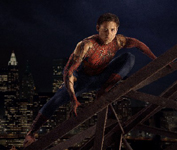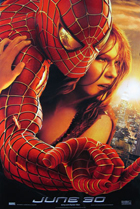Spider-Man 2
|  It is so rare that a sequel improves upon the original, but that is exactly what Sam Raimi and company have done with the magnificent Spider-Man 2. The movie keeps the same formula of balancing angst-ridden pathos with thrilling special-effects-laden action, but this time around it feels deeper and richer, perhaps because we've gotten to know the characters more. Spider-Man 2 is one of those rare summer blockbusters that is more than sound and fury in that its characters are genuinely intriguing and worth caring about, which makes the dramatic sections hum with human poignancy and also adds gravitas to the action because we are emotionally involved in what happens beyond the sheer spectacle of it all. It is so rare that a sequel improves upon the original, but that is exactly what Sam Raimi and company have done with the magnificent Spider-Man 2. The movie keeps the same formula of balancing angst-ridden pathos with thrilling special-effects-laden action, but this time around it feels deeper and richer, perhaps because we've gotten to know the characters more. Spider-Man 2 is one of those rare summer blockbusters that is more than sound and fury in that its characters are genuinely intriguing and worth caring about, which makes the dramatic sections hum with human poignancy and also adds gravitas to the action because we are emotionally involved in what happens beyond the sheer spectacle of it all.The core of the story is Peter Parker (Tobey Maguire), who in the first film was dealing with adolescent turmoil while morphing into a wall-crawling superhero. This time around, he's a bit older, though not much, and his conflict is between his role as Peter Parker, a young man with dreams, desires, and ambitions, and Spider-Man, his crime-fighting alter-ego who must race off to save someone every time a police siren wails. This leaves him little or no time to engage in relationships with others, most notably Mary Jane Parker (Kirsten Dunst), the girl next door on whom he has had a crush his entire life. You will remember that the first film ended with his walking away from Mary Jane's confession of her love for him because to reciprocate would mean putting her in danger; every enemy of Spider-Man's would go after Mary Jane as a way of getting at him, and he refuses to endanger her. Regardless of which identity he is assuming at any given time, Peter/Spider-Man is intensely misunderstood, which is probably why so many youth identify so strongly with him (in this sense, he is very much like Harry Potter). As Peter Parker, he is a flunking college student who can't even hold down a job as a pizza delivery boy. He fails at both because performing his duties as Spider-Man takes up too much of his time and energy. His professors think he's lazy even though they recognize his innate brilliance, and he's riddled with guilt over the death of his Uncle Ben, something he could have stopped, but failed to for selfish reasons. And, as Spider-Man, he's misunderstood as a public menace, largely because of the intentionally misleading and sensational headlines printed by Daily Bugle editor J. Jonah Jameson (J.K. Simmons), who has it out for the web slinger. Peter is a geek, but a lovable one and one whom we respect because of his resilience and his tenacity. We can see why Mary Jane would be in love with him, even when she's engaged to marry J. Jonah Jameson's handsome, astronaut son, John (Daniel Gillies). The romantic angle in the film is thoroughly compelling, tender even; it may be the best pop movie romance since Jack and Rose thwarted the class divide in Titanic (1997). (Is it just a coincidence that Mary Jane is starring in a stage version of The Importance of Being Earnest, with its multiple identities and related romantic entanglements?) Of course, much of the romantic tension hinges on Peter's inability to tell Mary Jane why he can't be with her, and the fact that he keeps breaking her heart for all the right reasons tears away at you. These are two people you want to see together, yet fate and the realities of the world seem destined to keep them apart. Maguire and Dunst both give wonderful performances, finding the deepest recesses of humanity in their characters, and Raimi finds consistently interesting visual ways to depict their separation, such as the scenes in which Peter walks alone down city streets plastered with advertising posters bearing Mary Jane's picture. The screenwriter, Alvin Sargent (Oscar-winner for Ordinary People and Julia), working from a story by Smallville creators Alfred Gough and Miles Millar and novelist Michael Chabon, adds a new twist to Peter's superhero conflict by suggesting that his superpowers are, to an extent, determined by his desire. When Peter's apprehension about his alternate identity becomes too great, be begins to lose his powers, which eventually culminates in his giving up his role as Spider-Man altogether. This is an intriguing concept, as it aligns the superhero's physical strengths with his conviction, suggesting that true heroes are not accidental, but determined. This is spelled out quite obviously in a speech made by Peter's Aunt May (Rosemary Harris), and it would smack of cliche if it didn't follow a painful sequence in which Peter reveals to her for the first time his role in Uncle Ben's violent death. The villain this time around is Dr. Otto Octavius (Alfred Molina), a scientist who is working on a fusion experiment that goes terribly wrong. In the process, a freaky contraption he uses that involves four articulated octopus-like mechanical arms are fused into his spine and begin to take over his mind, turning him into the malicious Dr. Octopus (or Doc Ock), a name coined by, of course, J. Jonah Jameson. Like the Green Goblin (Willem Dafoe) in the first movie, Doc Ock is a conflicted villain, one who begins as a decent man (a sort of intellectual father figure to Peter) and is transformed into a villain by science run amok. Yet, even in their villainous states, both the Green Goblin and Doc Ock remain conflicted between their good and bad sides, which makes them a twisted mirror image of the Peter Parker / Spider-Man duality. Again, because Peter had emotional ties to Dr. Octavius before he went bad, their battles have an emotional depth that makes them that much more enthralling. Doc Ock's mechanical arms, brought to life through a combination of animatronics and digital wizardry, are like something from a horror movie, and Sam Raimi, who began his career with the cheerfully gory Evil Dead films, plays them up for all they're worth, giving them a malicious personality that is creepy-funny. The arms are guided by an artificial intelligence that takes over Doc Ock's mind, and he sometimes has conversations with the arms while they glide and slither Medusa-like around him, hissing and almost grinning. In a lesser movie, these arms would have been just a means for eye-catching destruction, but Raimi and his screenwriters invest them with something more. Because both Spider-Man and Doc Ock have the ability to crawl up and down the sides of the buildings, their battles have a jittery vertiginous quality. The battles are hectic, but Raimi doesn't allow them to descend into incoherence. Unlike Stephen Sommers' nausea-inducing camera gymnastics in Van Helsing, Raimi has an instinct for when and where to move and, most importantly, how much. There are impossible camera movements throughout the movie, in which we rapidly glide and spin in every conceivably direction up and down the sides of buildings, but it's done with a sense of reckless joy that nevertheless has a guiding intelligence behind it we can appreciate. When Spider-Man swings and swoops through the canyons between New York's skyscrapers, we're flying right along with him, basking in the exuberance that such freedom of movement would entail (the special effects have also improved since the last outing; the digital characters are less rubbery). The excitement and joy of the film is important to note, since all the discussion of angst and duality and conflict might make Spider-Man 2 seem like a downer. Granted, the emotions in the film are often dark and there are a few scenes that border on horror movie conventions (notably a hospital scene in which Doc Ock kills an entire team of surgeons), but Raimi never lets go of the brightly colored comic book vibe that informs the film's look (which is first suggested in the hand-drawn panels during the opening credits that recap the events of the first film). Spider-Man 2 is operatic and corny, but it's also true to its characters. This allows Raimi to have fun from time to time, being humorous without belittling them, particularly Peter, who is prone to slapsticky pratfalls that are an amusing counterpoint to the graceful elegance he exhibits as Spider-Man. J. K. Simmons has further perfected his rat-a-tat delivery of J. Jonah Jameson's blustery dialogue; he's the most cartoonish thing in the story, but he's also one of the most fun things to watch in a movie that never has a dull moment. Copyright ©2004 James Kendrick All images copyright © Columbia Pictures |
Overall Rating: 


 (4)
(4)


